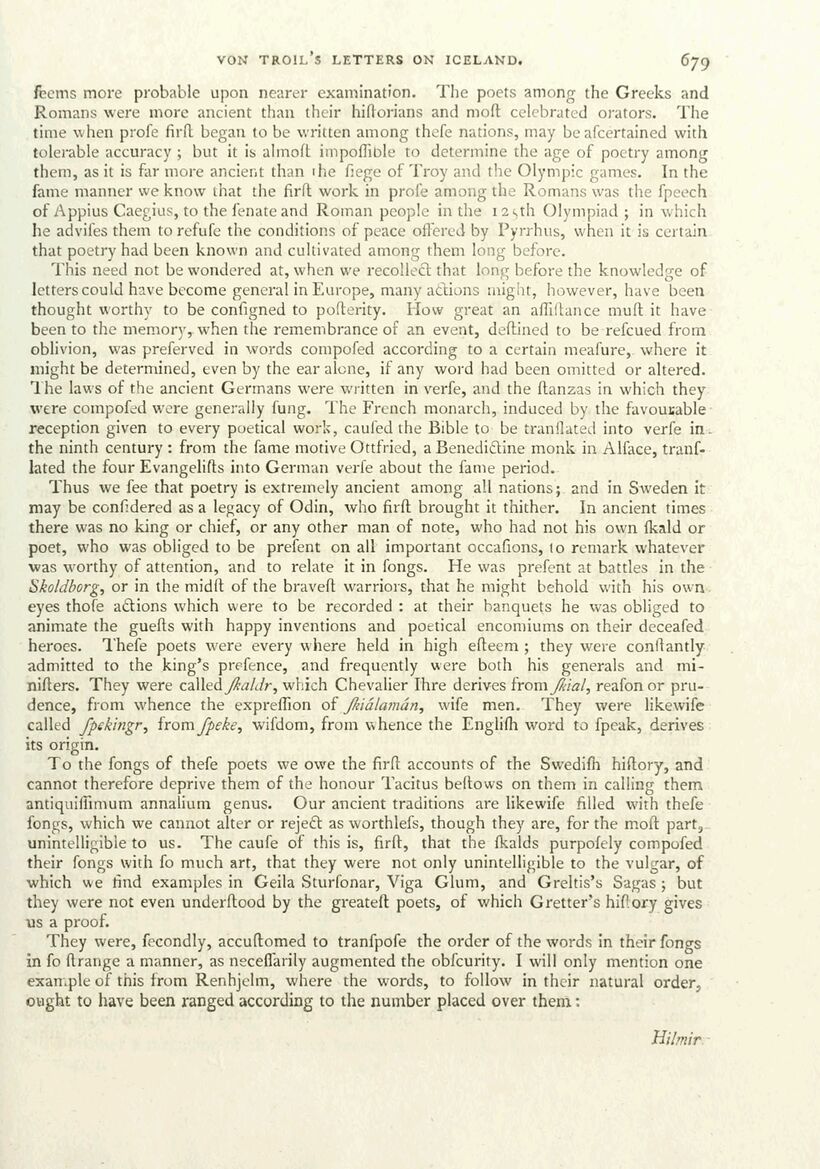
Full resolution (JPEG) - On this page / på denna sida - Pages ...

<< prev. page << föreg. sida << >> nästa sida >> next page >>
Below is the raw OCR text
from the above scanned image.
Do you see an error? Proofread the page now!
Här nedan syns maskintolkade texten från faksimilbilden ovan.
Ser du något fel? Korrekturläs sidan nu!
This page has never been proofread. / Denna sida har aldrig korrekturlästs.
VON TROIL’S LETTERS ON ICELAND, 679
feems more probable upon nearer examination. The poets among the Greeks and
Romans were more ancient than their hiftorians and moft celebrated orators. The
time when profe firft began to be written among thefe nations, may be afcertained with
tolerable accuracy ; but it is almoft impoffible to determine the age of poetry among
them, as it is far more ancient than the fiege of Troy and the Olympic games. In the
fame manner we know that the firft work in profe among the Romans was the fpeech
of Appius Caegius, to the fenate and Roman people inthe 124th Olympiad ; in which
he advifes them to refufe the conditions of peace offered by Pyrrhus, when it is certain
that poetry had been known and cultivated among them long before.
This need not be wondered at, when we recollect that long before the knowledge of
letters could have become general in Europe, many actions might, however, have been
thought worthy to be configned to pofterity. How great an affiftance muft it have
been to the memory, when the remembrance of an event, deftined to be refcued from
oblivion, was preferved in words compofed according to a certain meafure, where it
might be determined, even by the ear alone, if any word had been omitted or altered.
The laws of the ancient Germans were written in verfe, and the ftanzas in which they
were compofed were generally fung. The French monarch, induced by the favouxable
reception given to every poetical work, caufed the Bible to: be tranflated into verfe in-
the ninth century: from the fame motive Ottfried, a Benedictine monk in Alface, tranf-
lated the four Evangelifts into German verfe about the fame period.
Thus we fee that poetry is extremely ancient among all nations; and in Sweden it
may be confidered asa legacy of Odin, who firft brought it thither. In ancient times
there was no king or chief, or any other man of note, who had not his own fkald or
poet, who was obliged to be prefent on all important occafions, to remark whatever
was worthy of attention, and to relate it in fongs. He was prefent at battles in the
Skoldborg, or in the mid{t of the braveft warriors, that he might behold with his own.
eyes thofe actions which were to be recorded: at their banquets he was obliged to
animate the guefts with happy inventions and poetical encomiums on their deceafed
heroes. ‘Thefe poets were every where held in high efteem; they were conttantly:
admitted to the king’s prefence, and frequently were both his generals and mi-
nifters. They were called /a/dr, which Chevalier Thre derives from /Zia/, reafon or pru-
dence, from whence the expreffion of /tidlamén, wife men. They were likewife
called /pekingr, from /peke, wifdom, from whence the Englifh word to fpeak, derives
its origin.
To the fongs of thefe poets we owe the firft accounts of the Swedifh hiftory, and
cannot therefore deprive them of the honour Tacitus beftows on them in calling them
antiquiffimum annalium genus. Our ancient traditions are likewife filled with thefe
fongs, which we cannot alter or reject as worthlefs, though they are, for the moft part,
unintelligible to us. The caufe of this is, firft, that the fkalds purpofely compofed
their fongs with fo much art, that they were not only unintelligible to the vulgar, of
which we find examples in Geila Sturfonar, Viga Glum, and Greltis’s Sagas; but
they were not even underftood by the greateft poets, of which Gretter’s hiftory gives
us a proof.
_ They were, fecondly, accuftomed to tranfpofe the order of the words in their fongs
in fo ftrange a manner, as neceflarily augmented the obfcurity. I will only mention one
example of this from Renhjelm, where the words, to follow in their natural order,
ought to have been ranged according to the number placed over them :
Hilmir-
<< prev. page << föreg. sida << >> nästa sida >> next page >>